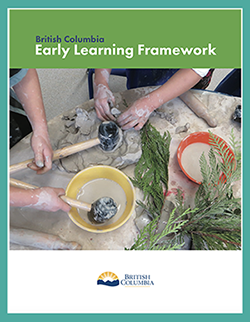Tools
Glossary
All-world relations |
The understanding that humans, creatures, plants, trees, and non-living entities, forces, and landforms are all interconnected. |
Assimilation |
The practice of bringing into conformity with the customs and attitudes of a group. |
Collaborative Dialogue |
Asking for comments, questions, and ideas from children, families, colleagues, and community members. These help us to look at many different viewpoints. |
Colonization |
The action or process of taking control of people, land, and waters by an outside entity who then occupies the land, extracts its value, and dominates the people. |
Common worlds framework |
A framework that includes taking account of children’s relations with all the others in their worlds (B.C. Ministry of Education, 2019, p. 101). |
Critical reflection |
Thinking carefully about our beliefs, or the practice of questioning taken-for-granted understandings, assumptions, and values that are implicit in how we think about children, education, and learning |
Cross-generational learning |
Both older and younger generations have many things to teach and learn from each other that can benefit both individuals |
Cultural learning |
Cultural learning is the way people within a society or culture tend to learn and pass on information |
Culture |
The customs, arts, social institutions, and achievements of a specific nation, people, or other social group (Canadian Oxford Dictionary) |
Diverse abilities and needs |
Children with diverse abilities and needs may use different approaches to construct knowledge, test theories, explore, and express ideas. Some children may prefer more auditory or visual approaches, others may depend on social responses. |
Diversity |
The different beliefs, customs, practices, languages, behaviours, sexual orientation, gender identity and expression, and physical differences of individuals and cultural groups. |
Empathy |
Understanding, being aware of, being sensitive to, and vicariously experiencing the feelings, thoughts, and experiences of another. |
Ethical |
Morally right or morally acceptable. |
Ethically |
Conforming to accepted standards of conduct. |
Expressive language |
Expressive language is most simply the “output” of language. For example, how one expresses their wants and needs. |
Gender identity |
“A person's concept of self as male, female, both, or neither. This may be the same or different as their sex assigned at birth. |
Holistic |
A holistic approach recognizes that all areas of learning (physical, emotional, social, linguistic, visual, auditory, and intellectual are closely interrelated and occur simultaneously. |
Inalienable (rights) |
Unchallengeable, absolute, not able to be forfeited |
Inclusive learning and care |
The principle that children of all abilities, including children with diverse abilities and needs, have equitable access to quality learning and child care, and are supported in play and learning along with other children in a regular program. |
Indigenous |
A collective name for the original peoples of North America and their descendents. |
Inquiry |
Asking questions, making discoveries, and testing those discoveries. Inquiry is a way to search for new understanding. For example, an educator may pose an inquiry question such as, How might I think about time differently? What might emerge if I thought about time as flow, rather than in schedules?” |
Intergenerational knowledge holders |
Knowledge holders play a pivotal role in facilitating intergenerational, experiential, and ceremonial learning. |
Living inquiries |
The process of thinking and learning that happen as children, educators, materials, and ideas interconnect. “Living” suggests these processes are ongoing and always evolving. “Inquire” means to pay attention in multiple ways (study, explore, experiment, ask questions). |
Localized pedagogies |
Learning that focuses on local people, place, and history. Localized pedagogy is based on respecting the diversity of people and communities and resisting a “onesize-fits-all” approach to practice.” |
Pedagogical choices |
Everything educators choose to do with children, with the environment, materials, traditions, routines, songs and books. |
Pedagogical narration |
Noticing and collecting moments from daily practice and sharing them with colleagues, children and families. |
Pedagogist |
May be called “knowledge keepers” or “knowledge holders”. A professional who helps:
|
Pedagogy of listening |
Listening to all the ways that children express themselves. |
Place-based learning |
Place-based learning engages students in their community, including their physical environment, local culture, history, or people. With place-based learning, students get to see the results of their work in their community. They build communication and inquiry skills, learn how to interact with any environment, and gain a better understanding of themselves, as well as their place in the world. Place-Based Learning: A Multifaceted Approach |
Racism of low expectations |
Educators have low expectations of students based on biases or preconceptions stemming from social attitudes. |
Reciprocal conversations |
Having a conversation with someone is a reciprocal activity. This means that words are exchanged between two or more people. |
Reciprocal relationship |
Mutual benefit and interaction. A relationship between people, or other entities that is of benefit to both (all). |
Reconciliation |
Establishing and maintaining a mutually respectful relationship between Indigenous and non-Indigenous peoples in Canada. Follows from the truth of colonial history. For reconciliation to happen, there must be a awareness of the past, acknowledgment of the harm that has been inflicted, atonement for the causes, and action to change behaviour (Truth and Reconciliation Commission of Canada, 2015). |
Relational learning |
Understanding our world through the close relationships we have with certain things. |
Rhizome |
The underground system of ferns. Image used to show us that pedagogy is complex and surprising. |
Tokenistic |
The policy or practice of making only a symbolic effort. |
Traces |
Artifacts such as photos, notes, text, audio, journals, digital data or materials created by the children (drawings, paintings, and constructions). |
Worldview |
A way of seeing the world as connected to histories, traditions, modes of thought, ideas and relations to others. |
